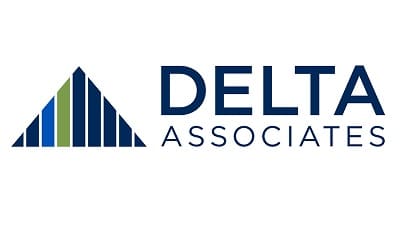
The Washington office market experienced a sharp drop in absorption in Q3 2023 amidst depressed market conditions. The metro area lost 775,000 of net SF, a steep drop compared to the second quarter of 2023. (Although the second quarter absorption was propped up by the completion of phase one of Amazon’s HQ2.)
The Washington area’s overall direct vacancy rate (which includes both multi-tenant and owner-occupied properties) increased 10 basis points in the third quarter. The current metro-wide direct vacancy rate for just multi-tenant office space is 18.4%, 50 basis points higher than a year ago.
We expect office demand to remain depressed in 2023 and beyond. As of now, we conservatively project that the metro-wide overall vacancy rate will be 14.2% at September 2025 (including owner-occupied space), an increase of 30 basis points from the current vacancy rate.
The average effective office rent for the Washington metro area is $34.71 per SF as of Q3 2023, up 0.7% from a year prior and up 0.2% from the second quarter. Suburban Maryland experienced the most meaningful effective rent growth over the last year at 2.5% (driven almost entirely by gains in the Bethesda/Chevy Chase and Frederick County submarkets). Meanwhile Northern Virginia gained 0.9% and the District of Columbia registered negative rent growth of just -0.1% between Q3 2022 and Q3 2023. The Washington metro area has lagged most other major office markets in rent growth this year, including Atlanta, Boston, New York, and Chicago.
Although short-term investment returns for office properties have been decimated nationwide, the Washington metro area continues to lag many other metro areas in the United States. The average 12-month return for properties in the Washington region plunged to -15.7% as of the second quarter of 2023, 120 basis points below the national average of -14.5%.
Office occupancy stubbornly hovers around 50% according to Kastle’s “Back-to-Work Barometer.” Vacancy rates continue to increase across the Washington metro area with little signs of reversing the trend. The federal government, which has been the biggest culprit behind the slow return to the office in the metro area, plans to continue bringing workers back to the office. However, this return to the office push is meeting heavy resistance from federal employees, especially those who have since relocated outside of the metro area due to the telework policies in place over the past few years since the pandemic. The federal government has over 4,000 job openings and continues to have negative job growth. The removal of remote work opportunities in tandem with its historically low wages in comparison with the private sector, although federal wages have been increased by 4.6% for 2023 (and are likely to get another increase anywhere from 5%-9% for 2024), will continue to hamper the federal government’s ability to hire. These difficulties facing the office sector will likely continue well into 2024, putting more pressure on the federal government’s return-to-the-office push.
THIRD QUARTER 2023HIGHLIGHTS
- Net absorption:-775,000 SF during Q3 2023, down from 2.08 million SF in Q2 2023.
- Direct vacancy rate (incl. owner-occupied):9% as of Q3 2023, up 10 basis points since Q2 2023 and up 30 basis points from one year prior.
- Under construction:4 million SF.
- Effective rents: Up 0.7% from one year prior.
- Investment sales: $374.4 million ($161/SF) during Q3 2023, compared to $1.2 billion ($285/SF) during Q3 2022.
Delta Associates, the research affiliate of Transwestern, is a firm of experienced professionals which has been providing consulting and subscription data services to the commercial real estate industry for over 40 years.






